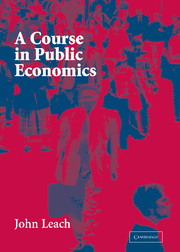Book contents
- Frontmatter
- Contents
- List of Figures
- Preface
- 1 Introduction
- Markets
- Externalities
- Public Goods
- Imperfect Competition
- Taxation and Efficiency
- Asymmetric Information and Efficiency
- Asymmetric Information and Income Redistribution
- 23 The Distribution of Income
- 24 The Limits to Income Redistribution
- 25 Redistributing Income through Tagging and Targeting
- 26 The Role of Government in a Market Economy
- A Note on Maximization
- References
- Index
23 - The Distribution of Income
from Asymmetric Information and Income Redistribution
Published online by Cambridge University Press: 06 July 2010
- Frontmatter
- Contents
- List of Figures
- Preface
- 1 Introduction
- Markets
- Externalities
- Public Goods
- Imperfect Competition
- Taxation and Efficiency
- Asymmetric Information and Efficiency
- Asymmetric Information and Income Redistribution
- 23 The Distribution of Income
- 24 The Limits to Income Redistribution
- 25 Redistributing Income through Tagging and Targeting
- 26 The Role of Government in a Market Economy
- A Note on Maximization
- References
- Index
Summary
Each person's welfare under the market system is determined by three factors:
Tastes and needs. Some people, such as the disabled and the chronically ill, need to consume large quantities of goods and services to maintain even a moderate level of economic welfare. On the other hand, healthy and free-spirited individuals might be quite content with few material possessions.
Prices. Given his income, each person can buy more goods and services when prices are lower, and therefore prefers low prices to high prices. A fall in any given price, however, will impact each person to a different degree. A reduction in the price of prescription drugs, for example, will have little effect on the welfare of the healthy, but will greatly impact the chronically ill.
Income. At given market prices, each person can afford to buy more goods and services when his income is higher.
Differences in these three factors across the population lead to disparities in economic welfare. Because disparities that arise from the first two causes can be offset by a redistribution of income (e.g., transfers to the chronically ill from the rest of the population), disparities in economic welfare can ultimately be ascribed to the distribution of income.
Just how unequal is the distribution of income? Pen visualizes the income distribution as a parade. Every income-earner in the economy marches in the parade, at such a rapid pace that they all pass in front of us over the course of one hour.
- Type
- Chapter
- Information
- A Course in Public Economics , pp. 349 - 367Publisher: Cambridge University PressPrint publication year: 2003



